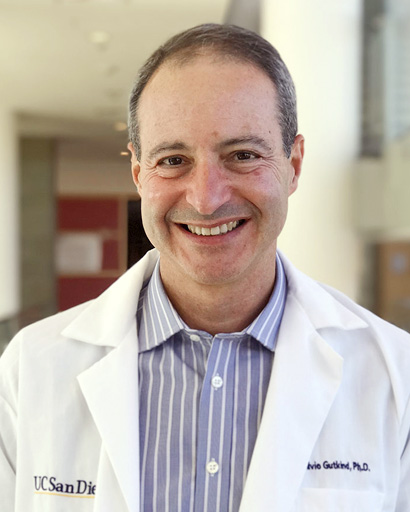- UCSD Moores Cancer Center
- Pharmacology
- (858) 534-5980
- sgutkind@ucsd.edu
J. Silvio Gutkind, Ph.D.
Professor, Associate Director for Basic Science
Genes of Interest
Clinical Cancer Teams
Research Statement
The goal of my research program is to exploit the emerging information on dysregulated signaling circuitries and individual genomic and molecular alterations to identify new therapeutic options to prevent and treat cancer. My laboratory has focused on the study of growth-promoting signal transduction pathways, the nature of the dysregulated signaling networks in cancer with emphasis on head and neck cancer, and on the use of genomic, proteomic, and system biology approaches to study cancer progression. Specifically, we have shown that human and virally-encoded G proteins and G protein coupled receptors (GPCRs) can display potent oncogenic activity and that many human malignancies harbor mutations in this receptor family and their linked G proteins. We have studied the tumorigenic activity of G proteins and GPCRs to dissect the signaling circuities regulating normal and aberrant cell proliferation, cancer progression, tumor-induced angiogenesis, and metastasis. We are now investigating the mechanisms by which genetic mutations in Gαq proteins initiate uveal and cutaneous melanoma, the role of Gαs and its target, PKA, in cancer, and how mutations and autocrine activation of GPCRs contribute to tumor progression, immune evasion, and therapy resistance. In parallel, we are exploring the role of the mTOR pathway in cancers of the oral cavity, a disease that results in 250,000 deaths each year worldwide. I have led a national and international effort addressing oral malignancies as the Chief of the Oral and Pharyngeal Cancer Branch, National Institute of Dental and Craniofacial Research, from 1998 until the recent relocation of our research team to the UCSD Moores Cancer Center in September, 2015. I am currently the Associate Director of Basic Science, and Co-Director of the Head and Neck Cancer Center at the Moores Cancer Center at UCSD. Based on our prior studies, and emerging results from our recently completed multi-institutional clinical trial targeting mTOR in oral cancer, we are now investigating the effectiveness and mechanism of action of PI3K/mTOR inhibitors for oral cancer prevention and treatment. I have been a member of numerous editorial boards of scientific journals and national and international advisory committees. With respect to training, I have supervised and mentored many graduate students (as well as Research Fellows and Tenure-track Investigators), who are now playing leadership roles in multiple institutions in the US and abroad.



